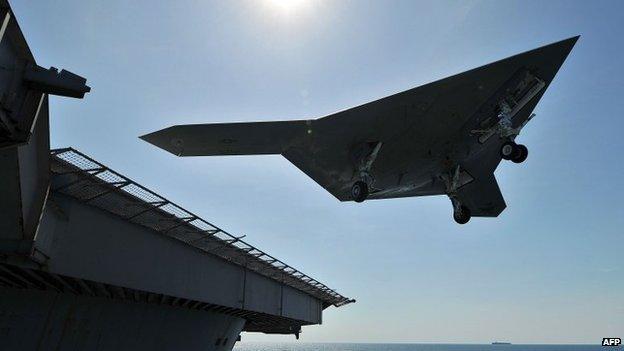Iraq crisis poses military dilemma for US
- Published

The Pentagon is sending the aircraft carrier USS George HW Bush into the Gulf
An impending decision by US President Barack Obama could prove to be a turning point in the way the West approaches the dual conflicts in Iraq and Syria.
As a US Navy aircraft carrier group with dozens of strike aircraft steams northwards up the Gulf and President Obama reviews the military options presented to him by his National Security Council, the US faces a difficult dilemma that could profoundly affect Western nations.
If Washington does not intervene militarily to support the Iraqi government by helping it stem the advance of Isis (the Islamic State in Iraq and the Levant) - the extreme jihadist group now controlling large parts of Iraq and Syria - the US will be accused by some of "weakness in the face of terrorism", "giving up on the Middle East" and of abandoning an ally in whom it has already invested billions of dollars of taxpayers' money in aid, and where more than 4,000 US servicemen and women have lost their lives.
But if the US does decide to intervene militarily, most likely with air strikes or missile strikes against clearly identified Isis positions, then it will change the whole dynamic of this Middle East conflict.
Broadly, there are two ways this will manifest itself:
Global terrorism
If Isis fighters die as a direct result of any future US air or missile strikes, there will inevitably be calls for revenge against the US and its allies, including Britain.
So far, there are no confirmed reports of UK jihadists fighting with Isis in Iraq.
But most of the estimated 400-500 British jihadists who have gone to fight in Syria are with Isis, whose forces straddle both sides of the Syria-Iraq border.
It is only a matter of time before some filter across the increasingly blurred border between Syria and Iraq.
If Isis fighters are "martyred" by US airstrikes then this, at a stroke, brings the US into this wider conflict and makes it an active enemy of Isis.
It takes no great leap of imagination to predict this will increase the threat of terrorist attacks in the West by jihadists returning from the Middle East.
Sectarian tension
Regardless of how any such military intervention is presented by the White House, it will be perceived by many in the Middle East not as the US supporting a legitimate government against a violent insurgency, but as the US joining forces with a Shia-dominated government in Baghdad, allied to Iran, to attack Sunni forces.
Given the enormous sectarian tensions between Sunnis and Shias in so many countries across the Middle East, from Lebanon to Bahrain, this perception of US bias, whether or not it has any foundation, comes at a sensitive and dangerous time.

Last week, as Isis forces charged headlong southwards towards Baghdad, US military intervention looked almost inevitable.
This week, with signs that Isis is looking to consolidate its gains in the areas it has taken rather than advancing into Shia-dominated cities, the immediate pressure on Washington may be off.
But remembering the speed with which this latest crisis erupted last week, the decision of whether or not to lend active air and missile support to Baghdad is one which the US will not be able to put off indefinitely.